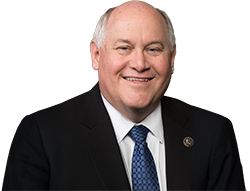Reps. Estes, Connolly Introduce Seniors' Access to Quality Care Act
Washington,
September 14, 2022
|
Roman Rodriguez
(316-262-8992)
WASHINGTON – Yesterday Congressman Ron Estes (R-Kansas) and Congressman Gerry Connolly (D-Virginia) introduced bipartisan legislation to address a critical shortage of Certified Nursing Assistants (CNAs). H.R. 8805 – the Ensuring Seniors' Access to Quality Care Act – will allow nursing homes that have been forced to suspend in-house CNA education programs after receiving a certain level of penalties to resume those programs once quality standards are met. This bill is companion legislation to S.4381 introduced by Sen. Mark Warner (D-Virginia) and Sen. Tim Scott (R-South Carolina). "Nearly every business and industry is suffering from workforce shortages, but perhaps some of the most impactful shortages are those within facilities providing care to others," said Rep. Estes. "This bipartisan bill is critical right now to address the devastating shortages of CNAs, especially in rural areas, by allowing nursing homes to resume CNA education programs faster. The Ensuring Seniors' Access to Quality Care Act makes certain that nursing homes continue to meet high standards without losing staffing levels that are needed for quality care." In-house CNA education at nursing homes is often free to the CNA candidate, allowing students to avoid the burden of paying for an education program at a local community college or school which may or may not exist in their geographic area. This helps meet the need for CNAs while allowing nursing homes to build their own pipelines of skilled nursing staff. Under current law, nursing homes that receive a threshold number of penalties for deficiencies in quality have a two-year mandatory suspension placed on in-house CNA certification programs. The Ensuring Seniors' Access to Quality Care Act allows suspensions on in-house CNA education to be rescinded once deficiencies are assessed and found to be remedied while allowing for additional oversight of facilities not exceeding the original two years. |







